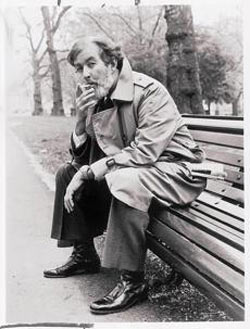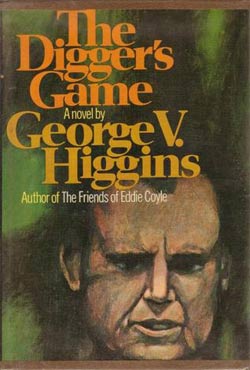 So many people have been cited as influences on the films of Quentin Tarantino that it’s laughable. I might as well say my 21-month-old daughter influenced Reservoir Dogs. But if there’s one crime fiction writer who could rightly make the claim (were he still living), that would be George V. Higgins.
So many people have been cited as influences on the films of Quentin Tarantino that it’s laughable. I might as well say my 21-month-old daughter influenced Reservoir Dogs. But if there’s one crime fiction writer who could rightly make the claim (were he still living), that would be George V. Higgins.
Think about the famous scenes in Reservoir Dogs and Pulp Fiction in which hard boys make small talk about quarter pounders and whether or not wait people should be tipped, in the midst of planning crimes. Imagine those scenes as being written out in the pages of a gritty crime novel set in Boston in the 1970s, and you start to get the feel of what Higgins’s best work is like.
Talking is mostly what happens in Higgins’s novels. He was a big believer in using dialogue as a way of telling a story. If the reader isn’t willing to sit there and intently listen to the discussions between the characters, and sometimes read between the lines in the talks, the reader is not going to be able to follow the story. In The Friends of Eddie Coyle, Higgins’s first published novel, from 1972, chitchat between seedy characters makes up something like 85 percent of the book’s content. Eddie Coyle is still the title for which Higgins is most known. It’s been championed by the likes of Ross MacDonald, Elmore Leonard, and Dennis Lehane, and it was made into the classic film noir of the same title, with Robert Mitchum in the lead role. But while some seem to want to think of Higgins as a one-hit wonder, he actually penned several more stone classics of hard-hitting noir fiction. The best of the others might very well be Eddie Coyle’s follow-up, 1973’s The Digger’s Game.
The Digger’s Game is basically about two Boston-area underworld characters, both of whom have some big problems in the present. The Digger runs a bar and has a wife and some kids, but he is no ordinary business owner and family man.
The Digger is a long-time thief who is generally up for pulling heists if they look good, and often needs to pull them to bring in some cash to get himself out of some kind of trouble he’s cornered himself into. He has a tendency to get caught in his crimes, and while he’s done some jail time, he has mostly stayed out of the kind of big trouble he seems destined for, and in large part this is due to the influence of his brother: a well-connected man of the cloth who has called on powerful contacts to keep The Digger away from lengthy stretches in the pokey.
The spot The Digger’s in at the time of this story resulted from him losing control while on a gambling bender during a mob-organized junket to Vegas. The Digger comes away from that outing owing the mob thirteen grand plus interest. He doesn’t know where he can get that kind of money; and while his brother gives him a little help to reel in at least a small chunk of the owed sum, he also tells The Digger this is the last time he’ll offer such assistance.
And this brings us to the other main character of the book: The Greek. The Greek is a journeyman mobster who currently works as a part of a three-man team, in which the other two guys organize those Vegas junkets (usually for well-heeled and naïve business execs) and, when they’re back in Beantown, The Greek collects the debts that the marks have run up. So it’s The Greek’s task to collect the owed funds from The Digger.
 The Greek knows The Digger from way back and has nothing against him personally, but business is business and he lets The Digger know that if he can’t pay up in time…well, you know, then things will happen to him, things like what usually happens to people who can’t pay money they owe to the mob. The Digger is far from The Greek’s only problem, though. Whereas The Greek is an old guard, no-nonsense mobster, his two current partners are the new breed—they wear flashy clothes, spend big bucks putting together a fancy office with a salaried secretary at the front desk, and are more interested in fooling around with college-aged girls than they are keeping their bodies fit and running a no-frills operation. The Greek is fed up with those two clowns, but the trouble is, they feel the same way about him and the local Don is inclined to side with them in all of this.
The Greek knows The Digger from way back and has nothing against him personally, but business is business and he lets The Digger know that if he can’t pay up in time…well, you know, then things will happen to him, things like what usually happens to people who can’t pay money they owe to the mob. The Digger is far from The Greek’s only problem, though. Whereas The Greek is an old guard, no-nonsense mobster, his two current partners are the new breed—they wear flashy clothes, spend big bucks putting together a fancy office with a salaried secretary at the front desk, and are more interested in fooling around with college-aged girls than they are keeping their bodies fit and running a no-frills operation. The Greek is fed up with those two clowns, but the trouble is, they feel the same way about him and the local Don is inclined to side with them in all of this.
So this is the main storyline that drives The Digger’s Game. But what really propels the book, and makes it such a gem of noir fiction, are the conversations between its characters, and the tone. People like The Digger, The Greek, and their associates talk about things like the Red Sox and the Bruins, their cars, their wives and girlfriends, etc. in the same deadpan tone they use when making plans to commit murder or grand larceny. None of the characters are particularly likeable, nor were they meant to be, and the whole book has about it a feel of quiet menace—and the more quiet, the more menacing.
When you read the dialogue-heavy scenes like the ones in which The Digger and his brother have their big falling out, or where The Digger is getting specs on a job that requires him to steal some live checks from a business operation, or where one of The Greek’s partners discusses with the mob’s brass what needs to be done about the troublesome Greek—the feeling that comes across from these glimpses into the underworld is as harsh and bleak as it is eerily emotionless. The overall effect is one that is as hard-boiled and authentic as it could be: something that reads like a combination of James M. Cain and Mario Puzo—and, yes, like a Tarantino film.
We’ll close with a couple samples of the dialogue from the book. Here’s the guy who hires The Digger to steal those checks, who wants to make sure The Digger is not a shitter, i.e. the kind of crook who gets scared on a job and soils his trousers at a crucial moment:
Well, in case you get the urge, wait till you get home or something. I had a real good guy that I always used, and he was all right. He could get in any place. You could send him down the Cathedral and he’d steal the cups at High Mass. But Jesus, I used him probably six or seven years and I never have the slightest problem with him, and the next thing I know, he’s into some museum or something they got out there to Salem, and he’s after silver, you know? And he shits, he turned himself into a shitter. Left himself a big fuckin’ pile on the goddamned Oriental rug…I didn’t have no more use for him.
Later in that conversation, The Digger says to the guy:
Jesus, I don’t know where the hell you’d be without us guys hard pressed for dough. You’d probably have to go work for a living.
Which brings the response:
Some guys need more’n they have, some guys have more’n they need. It’s just a matter of getting us together, Dig, that’s all it is.
And in the centermost of all the conversations in the book, the one in which The Digger and his brother let it all out in discussing familial obligations, guilt, betrayal, earthly versus heavenly pleasures, etc., The Digger offers his religious brother his thoughts on how he feels about whether he’s headed up or downstairs when he’s dead:
I figure, I make it, great. They gotta, there’s gotta be some reason, they call it Paradise. I don’t make it, it’s there to be had, well, too bad, at least I’ll see all my friends in the other place. And if there isn’t no other place, either kind, well, at least I didn’t waste no time worrying about it.
Brian Greene’s short stories, personal essays, and writings on books, music, and film have appeared in 17 different publications since 2008. He writes regularly for Shindig!, a U.K.-based music magazine with worldwide distribution. Greene lives in the Triangle area of North Carolina with his wife Abby, their daughters Violet and Melody, and their cat Rita Lee.

This is a book I can still quote from memory forty years later. I think that says it all.
If you’re interested in Higgins’ books, his life is even more fascinating. I just finished George V Higgins: The Life and Writings — McFarland Pubs.
Super read, fascinating, gives a deep deep look at Higgins, his motivations, his demons, his work and his early death. The author, E Ford, writes like a dream.
I highly recommend the biography.
C Ambrose
C-
Thanks for the tip. I’ll look into the bio.